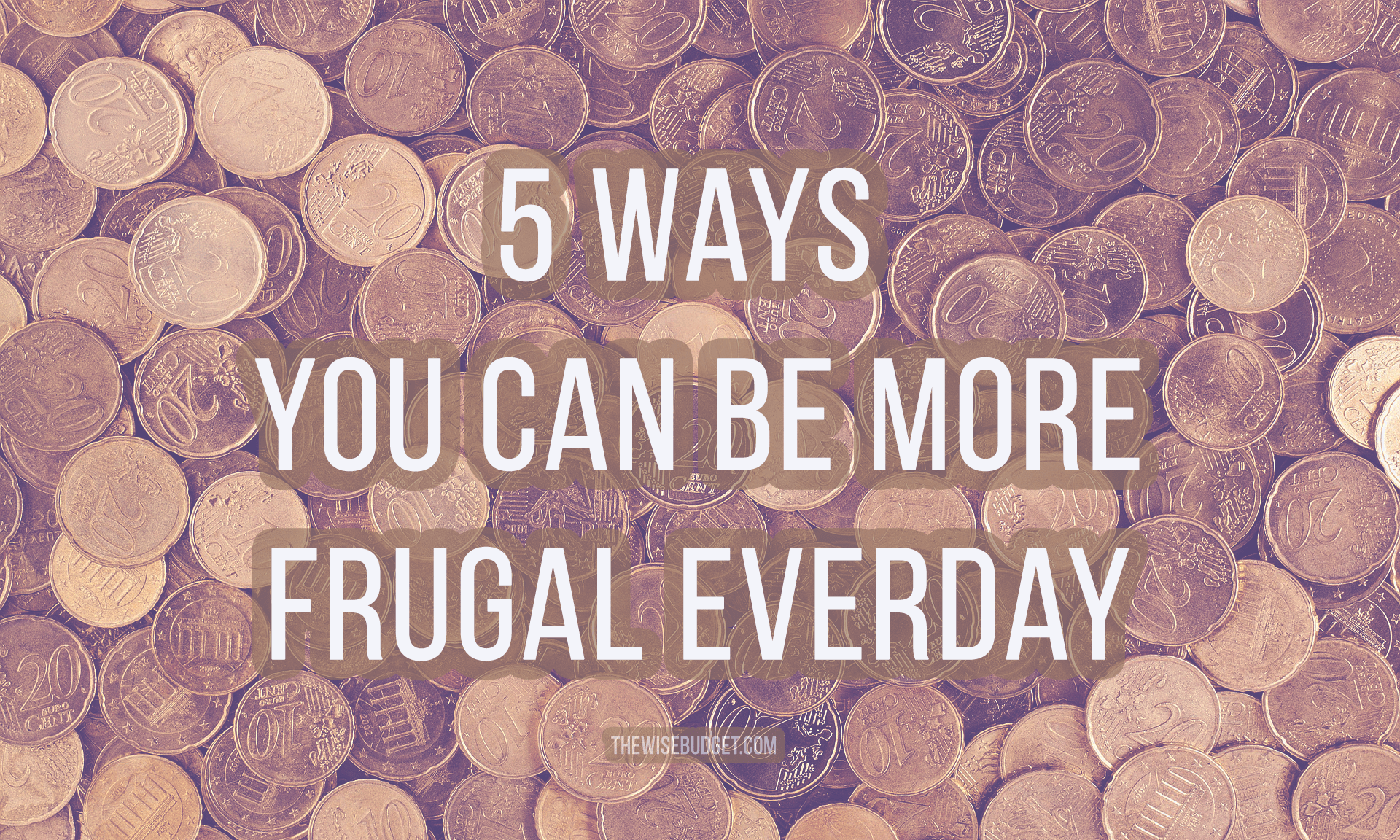5 Ways To Be More Frugal Everyday

Are you frugal?
According to a study by the Bureau of Economic Analysis, Americans need around $40,000 a year in order to live comfortably. The minimum wage? Roughly $15,000.
In different parts of the world, this is no different.
In South Korea, for example, the average annual expense to live a comfortable life is roughly $16,800. The minimum wage? Around $14,400. A bit better than the US.
In the Philippines, meanwhile, to have a comfortable life as a single person, you have to spend around $9,000 a year. The minimum wage? A pitiful $3,200.”|
It’s getting harder and harder to save money in this high-consumption world, but that’s why it’s more important than ever to be frugal.
Here are some simple tips that can help you be more frugal in your everyday life.
Frugal tip #1: Skip the morning coffee
At $1,100 a year, millennials in America are now spending more on their daily cup of $3 coffee than retirement plans. One millennial even claimed, “We live in the moment maybe (sic) more than others, so that concept of thinking about the future or retirement isn’t necessarily as big of a deal as it was in the past.”
This is certainly very alarming. This kind of view is the reason why 39% of 8,000 surveyed Americans have no savings at all, and the reason why 36% only have less than $10,000 saved for retirement.
There’s nothing wrong with a cup of coffee in the morning, but it becomes a problem when you’re spending more on it than on your future.
The solution? Skip the morning coffee, or at least stop buying from expensive coffee chains. If you really need a daily caffeine boost in the morning, then why not make your own coffee? It’s more affordable, plus it lets you make your coffee the exact way you want it.
Frugal tip #2: Walk, bike, or take public transportation
Do you drive your car to work every day? Convenient, isn’t it?
Now, let me ask: how much does your gas cost? And if you’re living far away from your work, how much time do you waste stuck in traffic?
Driving can offer convenience that possibly no public transportation ever can. However, it also comes with a lot of downsides that you can certainly afford to lose.
While I do love driving to work every now and then, I really hate traffic jams. Who does? To make the most of it, I usually listen to music or audiobooks. Still, that’s 45 minutes of my time and energy wasted on just waiting for the traffic to move.
During commutes though, you know what I’ve managed to accomplish? I’ve brainstormed countless ideas on my phone, I’ve memorized 5000 words of French on Anki, I’ve reviewed countless of subjects in college, and I’ve listened comfortably and carelessly to dozens of audiobooks. I literally think of my commute as an opportunity to be productive.
However, this only applies to when your job or school is far away from your house. If it’s reasonably near, you’d benefit more from the extra time afforded by two other alternatives: walking or biking.
I’m a huge fan of walking. When I was in college, I attended a university campus that spans more than a thousand acres. You know how I got around my classes despite having to transfer to different buildings? I walked.
Walking is beneficial to your health. It also gives you peace of mind. Sometimes, when I’m writing and I’m stuck on something, I stand up, get out of my apartment, and walk for a few minutes. Walking always helps me think clearly. And of course, it’s frugal.
Try to lessen your car use. If your school or job is too far to walk to or bike to, and you don’t want to take the public transportation, you can also do a carpooling with your friends or workmates. It helps lessen your daily expenses, and it also helps lessen the number of cars on the road that can emit dangerous gases to our ozone.
Frugal tip #3: Buy your groceries in bulk
This tip isn’t really about something you do on a daily basis, but it does help you be more frugal every day.
How often do you do your groceries? If you’re like the average person, you probably buy groceries once a week.
If you want to be absolutely frugal in both your time and money, though, you should probably consider doing your groceries only two-three times per month.
Yes, this requires a lot of planning. It also requires you to think in advance about the food that you’re going to be eating for the next week or two.
However, it does come with two advantages: 1.) you get to save money by buying in bulk and 2.) you get to be conscious of what you eat.
Ever since I attended college, I’ve been planning my groceries in advance. Normally, my breakfast consists of a bowl of oatmeal or cereals, berries, and a glass of milk. Since I buy in bulk, I get to enjoy supermarket discounts like, “Buy 2 for 10% off” or “Buy 2 and get 1 Free”.
Check out your local supermarket and browse the aisles for similar discounts. They may not seem like much, but believe me, it adds up over time.
Just be careful not to fall for every single discount sale you see! One important question to ask yourself is, “if this wasn’t on discount, would I buy it?” If the answer is no, then it’s safe to say that you probably don’t need it, anyway.
Frugal tip #4: Bring food from home
This has a lot to do with the previous tip. If you buy in bulk, then it’s only natural that you prepare your food yourself.
Then again, who doesn’t like eating out, right? If you eat out, then you don’t have to waste over an hour preparing and cooking, then another few minutes after cleaning up and washing the dishes. I do enjoy occasionally eating out with my friends, but I don’t do it often.
Here’s an incredible fact: Americans spend an average of $70,000 in one lifetime eating out. Considering the fact that 75% of surveyed Americans have 0 or less than $10,000 in retirement, then that’s certainly mind-blowing.
Back in college, I used to bring my own food to school. I used those microwavable plastic containers to store the food I prepared in the fridge, and then I’d just reheat them before leaving the house. It only took me a minute to reheat them, too.
Try doing some meal prep. Not only is it more frugal, you’ll also get to save money on eating out. Plus, you get to eat food that you actually like.
Trust me, your friends and coworkers couldn’t care less if you’re bringing your own food to school or work. (Hint: if they do, they’re probably not the kind of people that you should be keeping in your inner circles.)
Frugal tip #5: Use cash, not credit
48% of all transactions in the United States was done using plastic, according to the 2015 Diary of Consumer Payment Choice.
Just like drinking coffee, there’s also nothing wrong with using a credit or a debit card to do your purchases. After all, using cards can be very convenient. You don’t have to worry about bringing all your cash with you, you don’t have to count your change, and you don’t have to pull out paper bills when you need to pay for something.
The problem comes when using a card affects the way you think about your purchases.
I’ll give you one example.
A few years ago, I got into Korean beauty products. Since I don’t live in South Korea, and I didn’t know where to buy them here, I turned to online shopping. One time, I racked up over $200 worth of products just during one transaction! And I only realized it after I received my card bill.
Would I have spent $200 on beauty products had I been using cash? Probably not. Scratch that, no, I definitely wouldn’t. Laneige and Hera, you may be the goddesses of the Korean skincare & beauty world, but if I hadn’t been using a card, I probably could’ve resisted your seductive temptations. (But I have to say, if you guys are going to try out ANY Korean beauty product, I definitely suggest those two brands. Missha’s good too!)
See, just the physical act of parting away with your hard-earned cash is difficult enough for most people. We as humans tend to be loss-averse, meaning we tend to hold on to things for as long as we can.
But by using a card, you’re removing that tendency. That’s why people who use cards are more prone to overspending than those who stick to cold, hard cash.
The solution? Bring only the amount of cash you need for your daily transactions. If your money is not enough for what you want to buy, then that just means it’s out of your budget and you have to assess whether you really need it now or not.
Final Thoughts
It takes effort and discipline to be frugal in your everyday life, but it’s definitely possible. Always remember the saying, “a penny saved is a penny earned”!
If you want more saving tips, budgeting hacks, and money-related articles, feel free to follow me! You can also subscribe to my newsletter to receive a free copy of my eBook, “The Dos and Don’ts of Wise Budgeting”!







Briann
Great advice! I try to live frugally as we ar in the process of saving to relocate next year.
Miss Ai
Thank you Briann! Good luck with the move! Hope it all works out!